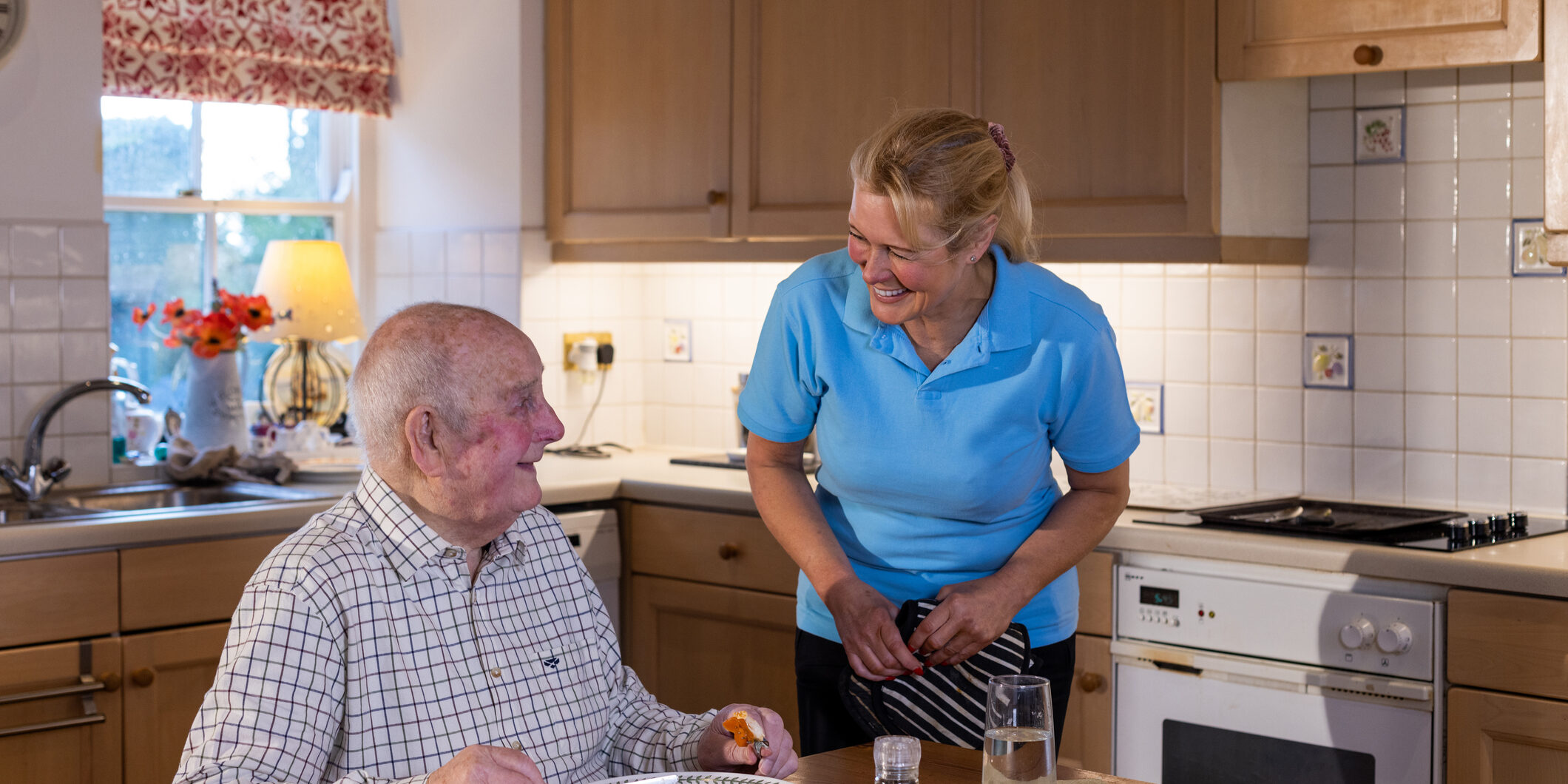At some point in our lives, we are faced with the difficult decision of choosing the living situation for ourselves or our loved ones. This could be because our loved ones are no longer capable of taking care of themselves, or we are no longer capable of taking care of them.
When it comes to elderly care in Adelaide, there are two prominent options to choose from: in-home nursing care and assisted living. In this article, we will explore these options and highlight why NDIS-approved in-home nursing care may be the better choice for elderly care in South Australia.

Understanding In-Home Nursing Care
In-home nursing care, as the name suggests, involves providing medical and non-medical care services to elderly individuals within the comfort of their own homes. It is a personalised approach to caregiving, offering a broad spectrum of services tailored to the unique needs and preferences of each individual.
These services can encompass medical care, assistance with daily activities, companionship, and more. In essence, in-home nursing care is a comprehensive and individualised solution for elderly care that prioritises comfort, independence, and overall well-being.
In-home nursing care services include a wide range of essential provisions designed to meet the unique needs of elderly individuals. These services are highly personalised, aiming to improve the overall well-being and quality of life for those receiving care.
Caregivers offer a comprehensive array of support, which may include medication management to ensure the correct dosage and schedule of medications. They also provide wound care, conducting dressing changes and assessments, especially for chronic conditions.
In addition to medical care, in-home nursing care extends to personal hygiene assistance, aiding with tasks like bathing, dressing, grooming, and toileting.
Nutritious meal preparation is another vital component, with caregivers planning and cooking meals to meet dietary needs. Mobility support is provided to assist with walking, transferring from one place to another, and even engaging in essential exercises.
Companionship is a significant aspect, offering social interaction and emotional support, which can be particularly crucial for combating loneliness.
Moreover, caregivers may undertake light housekeeping tasks, manage laundry, and even help with grocery shopping to ensure a safe and comfortable living environment for the elderly individuals they serve.
These services collectively form a holistic and compassionate approach to elderly care, promoting a sense of well-being, independence, and the preservation of cherished memories in the comfort of one's own home.
Benefits of In-Home Nursing Care
1. Comfort and familiarity of home
One of the most significant advantages of in-home nursing care is that it allows the elderly to age in place, surrounded by the familiar and comforting environment of their home. Being in a space filled with cherished memories, personal belongings, and a sense of independence often contributes to a higher quality of life and improved emotional well-being.
2. Personalised care
In-home nursing care is inherently tailored to the specific needs of the individual. Caregivers create personalised care plans to address the unique challenges and health requirements of each person. This level of customisation ensures that the care provided is highly effective and precisely aligned with the individual's well-being.
3. Independence and quality of life
Maintaining independence is a critical aspect of aging gracefully. In-home nursing care supports this by enabling the elderly to retain control over their daily routines and decisions. It empowers them to continue engaging in their hobbies, interests, and social activities, ultimately contributing to a higher quality of life.
Challenges and Considerations
Cost factors
The cost of in-home nursing care is determined by several factors. One of the primary considerations is the level of care required by the individual, with more comprehensive care and constant supervision incurring higher expenses. Additionally, the number of hours of care provided per day impacts costs, with 24/7 care being more expensive than a few hours of daily assistance.
The location where in-home care is provided can also affect the cost due to regional pricing variations. The skill level of caregivers plays a role, with specialised care requiring more expertise and potentially higher costs. Specific healthcare needs can further increase costs, particularly for specialised care services or medical equipment.
Moreover, additional expenses such as medical supplies or transportation may need to be considered. Lastly, factors like insurance coverage, government assistance, and the availability of Home Care Packages can influence the financial aspects of in-home nursing care.
Navigating these financial considerations is vital for making informed decisions about the care of elderly loved ones. Understanding the interplay of these factors is key to finding a care solution that aligns with both the unique needs of the individual and the available budget. Balancing the provision of necessary care with cost management is essential to ensure the best possible care for your loved ones.
Availability of qualified caregivers
Finding and hiring qualified, trustworthy caregivers can be a challenge. Families must conduct thorough research, background checks, and interviews to ensure they select the right caregiver. Additionally, caregivers need to be properly trained to handle various medical and non-medical tasks.
The selection process is not only about qualifications but also about finding caregivers who can provide compassionate and personalised care. Moreover, caregiver availability can vary by location, making it essential to assess the local caregiving landscape to secure the right fit for your loved one's needs.
Ultimately, the caregiver's expertise and commitment play a pivotal role in the effectiveness of in-home nursing care, making it crucial to invest time and effort in the selection process.
Home safety and accessibility
Ensuring the home is safe and accessible for an elderly individual can be a considerable task. Modifications may be needed to accommodate mobility challenges, reduce fall risks, and create a safe environment.
These modifications, while important, can add to the overall cost of in-home nursing care. It's essential to recognise that safety is a top priority, and investing in home modifications can significantly improve the quality of life and reduce potential risks.
These modifications may range from installing handrails and ramps to wider doorways and non-slip flooring. While they can contribute to the overall cost, they are a vital part of creating a secure and comfortable living environment for the elderly individual.
Moreover, home safety assessments can identify necessary modifications and ensure that the home is tailored to the specific needs of the person receiving care.

Exploring Assisted Living
Assisted living is an alternative approach to elderly care that provides a unique living arrangement where individuals reside in specialised facilities. These facilities are designed to cater to the specific needs of the elderly, offering a blend of personal care, support, and community living.
Assisted living bridges the gap between independent living and nursing home care, making it an option for those who require assistance with daily activities but still value their independence.
Assisted living facilities come in various shapes and sizes, but they often feature private or semi-private apartments or rooms. These living spaces are complemented by communal areas for dining, social activities, and recreation.
Many facilities also offer dining services, housekeeping, laundry, transportation, and 24/7 staff availability for assistance. The presence of on-site medical services and emergency response systems ensures that residents receive prompt care when needed.
Advantages of Assisted Living
Social interaction and community
Assisted living communities are hubs of social interaction, fostering a sense of belonging and companionship among residents. This communal environment encourages individuals to engage in group activities, build friendships, and maintain an active social life. The resulting sense of community can significantly enhance the quality of life for residents.
24/7 assistance and security
One of the notable advantages of assisted living is the constant availability of support and security. Trained staff members are on-site around the clock to assist with daily tasks, medication management, and emergency response. This continuous care gives both residents and their families peace of mind, knowing that help is always just a call away.
Drawbacks and Considerations
Transition challenges
Moving to an assisted living facility can be a significant transition, especially for those who have been living independently for most of their lives. Adjusting to a communal living environment, even with its social benefits, can take time and effort. Family members and caregivers should be prepared to support their loved ones through this transition period.
Reduced independence
While assisted living provides a supportive environment, it does come with some degree of oversight and reduced independence compared to living in one's own home. The level of personal freedom can vary depending on the facility and individual needs. Some individuals may find it challenging to adapt to a more structured living arrangement.
Cost comparisons
Assisted living costs can vary depending on several factors. The most common ones include the assisted living facility, the location, the type of accommodation, the type and amount of care services needed, and the amenities provided by the facility. Since the monthly costs vary greatly, it's hard to determine the exact price. The average monthly cost of assisted living facilities is $3,500 to $4,500 in Australia.
The average costs of these services depend on the facility. Some are more expensive than others. Location can also determine the price. The overall costs can be much higher in metropolitan areas. This also applies to the level of specialised care services provided.
It's essential for families to carefully consider their financial situation and whether assisted living is a sustainable option in the long term, taking into account the variations in costs based on these factors.
NDIS-Approved In-Home Nursing Care
The Importance of NDIS Approval
What is NDIS (National Disability Insurance Scheme)?
NDIS, short for the National Disability Insurance Scheme, is a government program in Australia that provides support and services to individuals with disabilities, including those with age-related conditions. It aims to enhance the quality of life and independence of those in need. NDIS approval is a significant indicator of high-quality care, ensuring that services meet rigorous standards and adhere to the principles of personalisation and empowerment.
Benefits of choosing NDIS-approved care
NDIS-approved in-home nursing care stands out for several reasons. First and foremost, it offers financial support that can alleviate the financial burden of care, making it more accessible to a broader range of individuals. Additionally, NDIS-approved care emphasises a person-centred approach, tailoring care plans to the unique needs and preferences of the elderly. This approach ensures that every aspect of care is highly customised, promoting a more comprehensive and effective caregiving experience.
Accessibility and Affordability
NDIS support for in-home care
NDIS provides funding for a wide range of support services, including in-home nursing care. This financial assistance can cover various aspects of care, from medical services to personal support and daily living activities. The availability of NDIS funding makes in-home nursing care more financially viable for many families, ensuring that elderly individuals can receive the support they need without the necessity of moving to an assisted living facility.
Cost-effectiveness compared to other options
When comparing the cost of NDIS-approved in-home nursing care to other options like assisted living, it often emerges as a cost-effective solution. The ability to receive personalised care at home, along with NDIS financial support, can make this choice more economical in the long run. Families can allocate resources efficiently, ensuring that the elderly individual receives the right level of care without incurring unnecessary expenses.
Tailored Care Plans
Customising NDIS Plans for Senior Care
NDIS-approved providers take a proactive approach to care planning. Caregivers work closely with the individual and their family to create a care plan that addresses specific needs and goals. This could include a mix of medical services, personal care, therapy, and social engagement, all customised to enhance the individual's well-being. The flexibility and adaptability of these care plans ensure that the elderly receive precisely the care they need at each stage of their aging journey.
Meeting the unique needs of individuals
The personalised nature of NDIS-approved in-home nursing care extends to every facet of the individual's care. Care plans are designed to support not only the physical health of the person but also their emotional and social needs. This holistic approach recognises that elderly care is not a one-size-fits-all solution, and tailoring the care to the unique requirements of each individual is essential for promoting a high quality of life.
Making the Right Choice
Assessing Individual Need
Evaluating the health and lifestyle of the elderly person
The decision between in-home nursing care and assisted living should begin with a comprehensive assessment of the elderly individual's health and lifestyle. Consider their medical conditions, mobility, and cognitive abilities. Additionally, take into account their preferences and desires for independence and social interaction. This assessment is the foundation upon which the right choice can be made.
Considering family dynamics and preferences
Family dynamics play a crucial role in the decision-making process. Open and honest discussions among family members are essential to understanding the collective wishes and expectations regarding the elderly person's care. Balancing individual preferences with family considerations is often a delicate yet vital aspect of the decision.
The NDIS Advantage:
It is imperative to shine a spotlight on the game-changer in the field of elderly and disability care in South Australia—NDIS-approved in-home nursing care. NDIS has redefined the way care is provided to individuals with disabilities and seniors in need of in-home care.
The NDIS approval signifies a commitment to the highest standards of care, ensuring that individuals receive personalised support that covers a broad spectrum of needs.
The advantages of NDIS-approved care extend beyond quality; they encompass funding for essential equipment, home modifications, and mobility aids, empowering individuals to maintain their independence and enhancing their overall quality of life.
South Australia has witnessed a transformation in care options, offering a holistic, person-centred approach that aligns perfectly with the well-being and comfort of elderly individuals.
NDIS-approved in-home nursing care and the tangible ways it has improved the landscape of elderly care in South Australia make it an attractive and comprehensive choice for those seeking top-tier care solutions.
Making the Best Choice for Elderly Care in Adelaide
In our exploration of elderly care in Adelaide, we've considered two primary options: in-home nursing care and assisted living. Each has distinct advantages and considerations, with the choice relying on the elderly individual's unique needs and preferences.
Throughout our discussion, NDIS-approved in-home nursing care has been a significant focus. This approach blends home comfort with professional care services, often preferred for elderly care in South Australia due to NDIS financial support.
Choosing the right elderly care approach is highly personalised, rooted in a deep understanding of the individual's health, lifestyle, and preferences, encompassing both medical and emotional aspects.
Ultimately, the decision between in-home nursing care and assisted living revolves around providing the best possible care for our loved ones in South Australia. Balancing individual needs, seeking professional guidance, and learning from others' experiences are vital. The goal is to enhance their quality of life, comfort, independence, and happiness.
As you embark on this journey of selecting the best elderly care in Adelaide, remember it's about enriching the lives of your loved ones, ensuring their later years are filled with compassion, respect, and the comfort they deserve.
Experience the Benefits of In-Home Nursing Care with FGCS in Adelaide
Are you or your loved one in need of in-home nursing care in Adelaide? Look no further than Friendly and Graceful Care Services (FGCS). Our team of dedicated specialist nurses is committed to providing the care and support you need in the comfort of your own home.
We understand the positive impact of home-based elderly care. With FGCS Community Nursing Care, we offer personalised services tailored to your clinical and personal needs, to enhance your quality of life.
Our main goal is to help you regain and maintain your independence, ensuring that you can safely and comfortably stay in your own home. By delivering support services directly to you, we reduce the need for frequent visits to medical facilities, making it a more convenient and cost-effective option for you and your family.
For a reliable partner in NDIS-approved in-home nursing care in Adelaide, choose FGCS and experience the difference it can make in your life or that of your loved one. Reach out to us today to learn more about our services.





